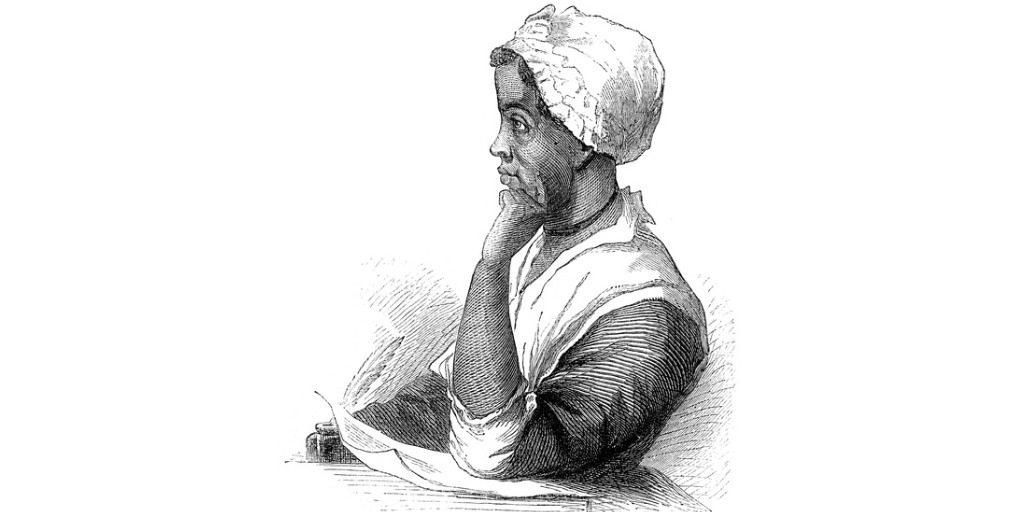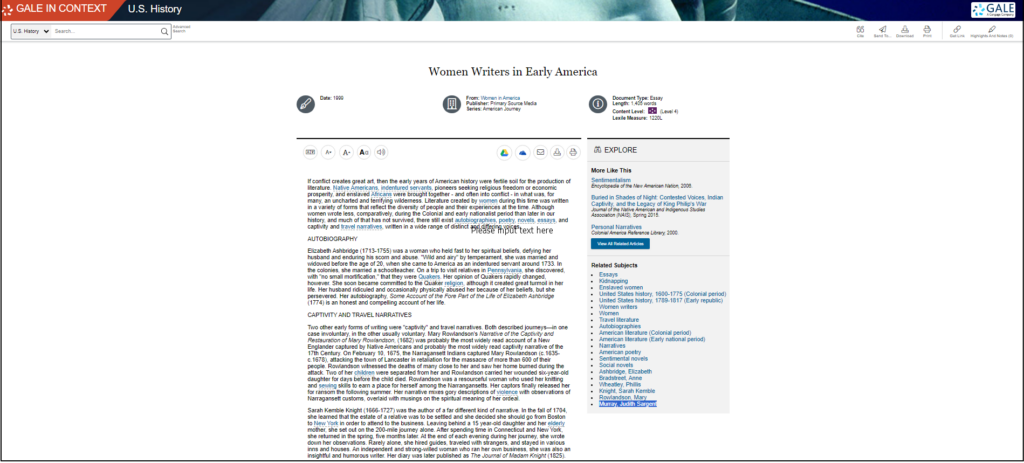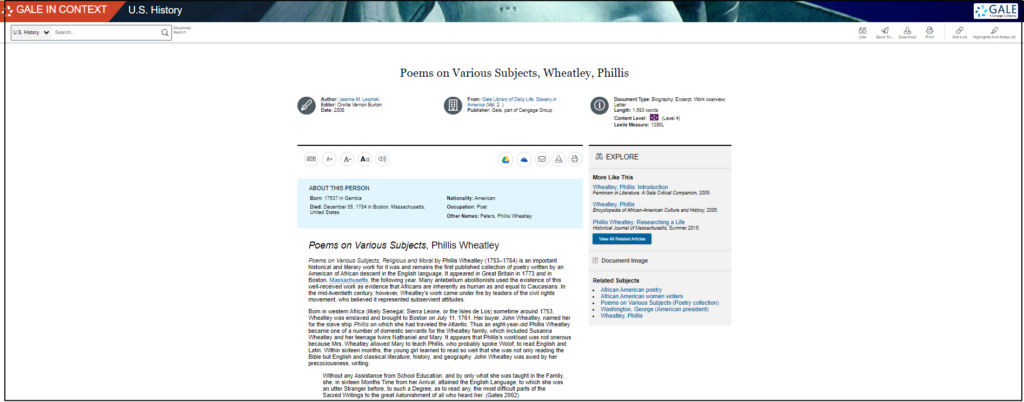| By J. Robert Parks |
Phillis Wheatley was born in West Africa in the mid-eighteenth century and sold into slavery when she was a young girl. She was enslaved by the Wheatley family. John Wheatley was a wealthy Boston merchant, and his wife, Susanna, exchanged money for the young girl, who was named after the ship, the Phillis, on which she had been trafficked. Phillis Wheatley published her first poem, “On Messrs. Hussey and Coffin,” in 1767 when she was just a teenager. She is best known for her Poems on Various Subjects, Religious and Moral, a collection of poetry published this week, 250 years ago, on September 1, 1773. Teachers and librarians wanting to introduce students to the person believed to be the first Black author and the second woman in America to publish a book of poetry will find a number of resources in Gale In Context: U.S. History.
It was apparent early on that Phillis was unusually gifted with language, and one of the Wheatleys’ children taught her to read and write. By the time Poems on Various Subjects was published, Phillis was not only an accomplished writer but she was also able to translate Latin poetry into English. Her translation of a passage from Ovid’s Metamorphoses is still considered one of the finest in the English language. Nonetheless, many people of her time doubted that an enslaved person could write such poetry, and Phillis had to go before a committee to prove that she herself had written her poems. Even that couldn’t convince many Bostonians, however, so the book was first published in London, England, and a year later in New England.
Although published female writers were more common in colonial America than female painters or other artists, they were still far outnumbered by their male counterparts. Female writers of the time tended to focus on autobiography, with travel narratives and “captivity” narratives being especially popular. Captivity narratives of this period weren’t written by enslaved people (that would come in the next century) but rather white women who had been abducted by Native Americans during violent encounters between them and the colonists.
As was common in Wheatley’s time, her poetry is filled with Christian imagery and also reflects a neoclassical influence, which held ancient Greek and Latin culture as worthy of emulation. Gale In Context: U.S. History makes connections between events in the United States and links them to trends and cultural movements around the world. A common motif in her poetry is the incorporation of the Sun and how it gives life. Some critics have connected that to her childhood experiences before she was abducted and enslaved.
Both literary critics and historians have disagreed over aspects of Wheatley’s life and work. Some have argued that her poetry shows little concern for her race or other people who were enslaved. Indeed, during the civil rights era in the mid-twentieth century, Wheatley’s poems were attacked for reflecting subservient attitudes. Others have noted, however, that freedom is an important theme in her poems, and abolitionists in the late eighteenth and nineteenth centuries held Wheatley up as an important example of how enslaved people were just as human as everyone else. She herself wrote in a letter, “In every human breast, God has implanted a principle, which we call Love of Freedom; it is impatient of oppression, and pants for deliverance.” Gale In Context: U.S. History brings debates regarding history to life through the inclusion of contemporary scholarship.
Shortly after Poems on Various Subjects, Religious and Moral was released in London, British newspapers attacked John Wheatley and his wife, Susanna, for continuing to keep Phillis enslaved. Whether that motivated the couple is uncertain, but Phillis wrote in a letter the following month that she had been given her freedom. In October 1775, she wrote a poem in honor of George Washington, then the commander of the Continental Army. Using rhymed couplets and echoes of classical poetry, the poem celebrates Washington and urges a goddess to protect him. Washington was so touched that he invited Wheatley to visit him in Cambridge, which she did in March 1776, just four months before the Declaration of Independence declared that all men are created equal.
About the Author
J. Robert Parks is a former professor and frequent contributor to Gale In Context: U.S. History and Gale In Context: World History who enjoys thinking about how our understanding of history affects and reflects contemporary culture.




